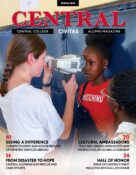
Paul Weihe, associate professor of biology
In April 2017, I did something I found incredibly difficult: I walked around the block in Des Moines.
It was difficult because I was part of the March for Science. Thousands of science-minded people walked around the State Capitol hoping to get the attention of legislators and our fellow citizens. We chanted and carried signs and gave speeches in an attempt to start an important conversation about the issues that we—all of us—face. It’s a conversation about our society, our planet and our future.
Unfortunately, leaders at all levels appear to need reminding that real progress toward a better future requires us to ask and answer questions using science. Until recently, a march for science would have seemed ridiculous. Who could deny science has contributed to our everyday quality of life? Who would question the use of scientific insight in decision-making?
But now, scientific societies are increasingly asking members to engage with politicians and the public. The memoranda and press releases, the podcasts and media interviews, the public outreach symposia and workshops are all efforts to get people like me to converse with fellow citizens.
It’s no longer enough for me to publish technical reports for other experts. I need to talk—and listen!—to non-scientists. I need to take part in a larger conversation about our shared future. We need to talk about food security, climate change, water quality, emerging diseases and other pressing issues.
This is not easy for someone of my age and training. I was educated in a culture of science that believed being objective (and being perceived as objective) was key to credibility. Science was supposed to be unbiased, to speak for itself. We even wrote in the stilted passive voice “experiments were initiated,” “observations were made,” “data were analyzed—” all presumably by some cold, logical science robot. Now, I teach students to own their work and to write in the first-person active voice: “I selected three sites,” “we listened for animal calls,” “I performed a statistical test.”
Of course, science has always been done by human beings, not nameless, faceless agents. And whether it is comfortable or not, we human beings who practice science need to speak up. I need to speak up. I need to fulfill my duty, to pay society back for its investment in me.
Why were all those classrooms and labs I studied in built? Why were all those books and films that educated me produced? Why did my teachers and mentors devote their time and hard work to train me? So that I could feel “smart?” So that I could enjoy fascinating myself with neat-o gadgets and scientific jargon? Hardly.
Society invested in me so that now, when we need science—and science education and public outreach—I can do the work. So, that is what I will do. I’m pleased to share my work with young people and colleagues. I’ll do radio interviews and blog posts. And if I even have to march—well, I suppose I’ll do that too. But I’d love a little company in all this.
Join me, won’t you?
This essay was adapted from a June 2017 post on the Sustainability at Central blog.
Read more of Paul Weihe’s thoughts on science and sustainability.












To encourage serious, intellectual discourse on Civitas, please include your first and last name when commenting. Anonymous comments will be removed.
Andy Thompson
|
8:51 am on February 1, 2019
Is it normal in science to declare that a debate is ended, and we will no longer entertain any other opinions? Seems like that is the prevailing view of those, like Professor Weihe, who insist they are advocating on behalf of science. I don’t think science is a democracy, where the majority get to determine what everyone else must think. In fact, it has often been the contrarians who have been proven right, because they challenged the orthodoxy of the time. Before you decide to use science as a tool to impose your green new deal, or some other form of social justice via science, at least be honest enough to admit that your version of science is just as political as that which you’re denouncing.
Kyle Winward
|
2:40 pm on December 18, 2018
Good for you (and us), Paul! It’s a scary time when politicians (and a U.S. president) question the motives of scientists. It’s terribly ironic when scientists are accused of being biased and in cahoots with “nameless, faceless agents” (I can’t think of a better example of the proverbial pot calling the kettle black).
Kyle Winward
|
2:27 pm on December 18, 2018
An excellent summary and call to action. Thank you for sharing your passions and being a great example for us all, Paul!